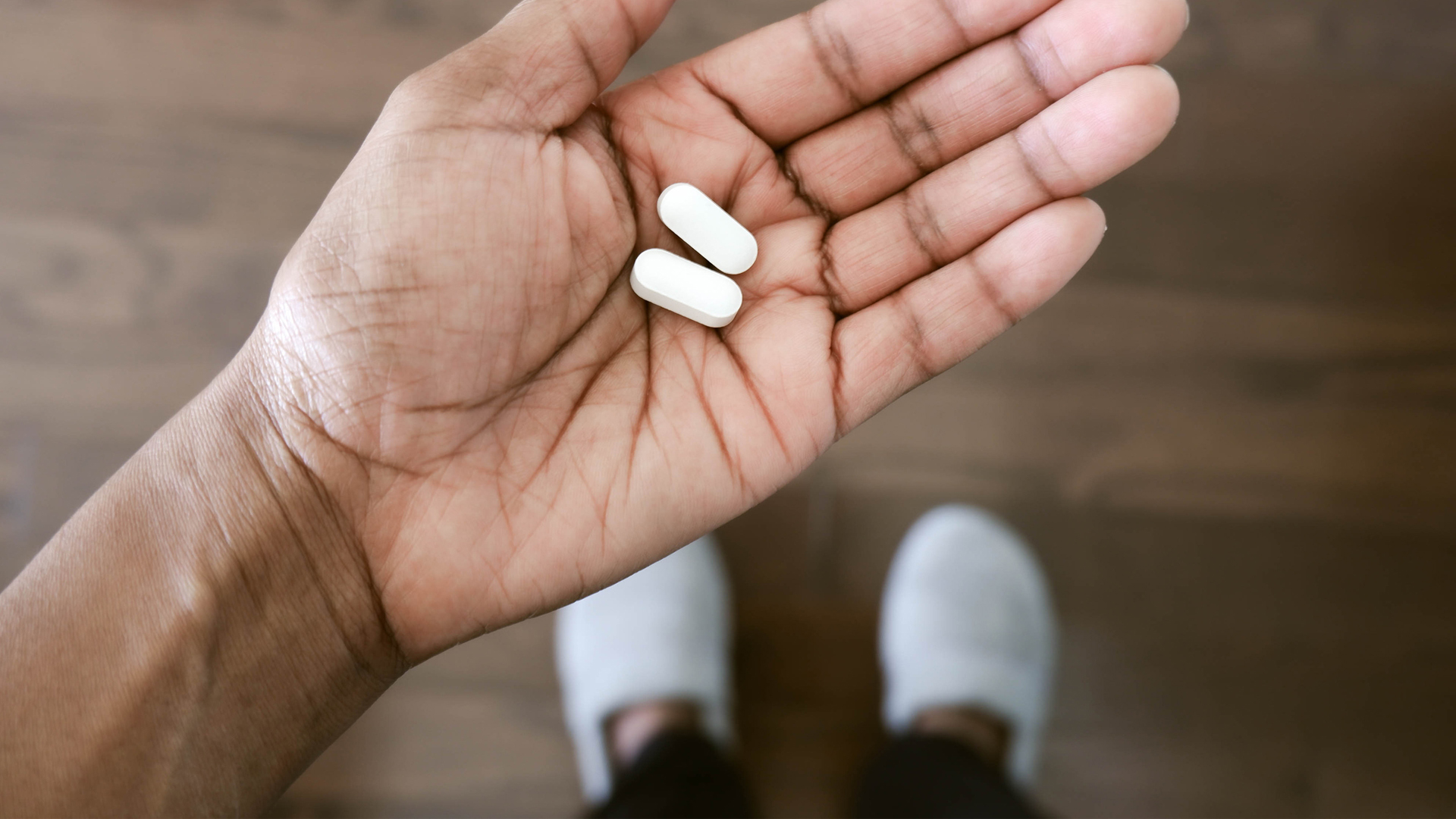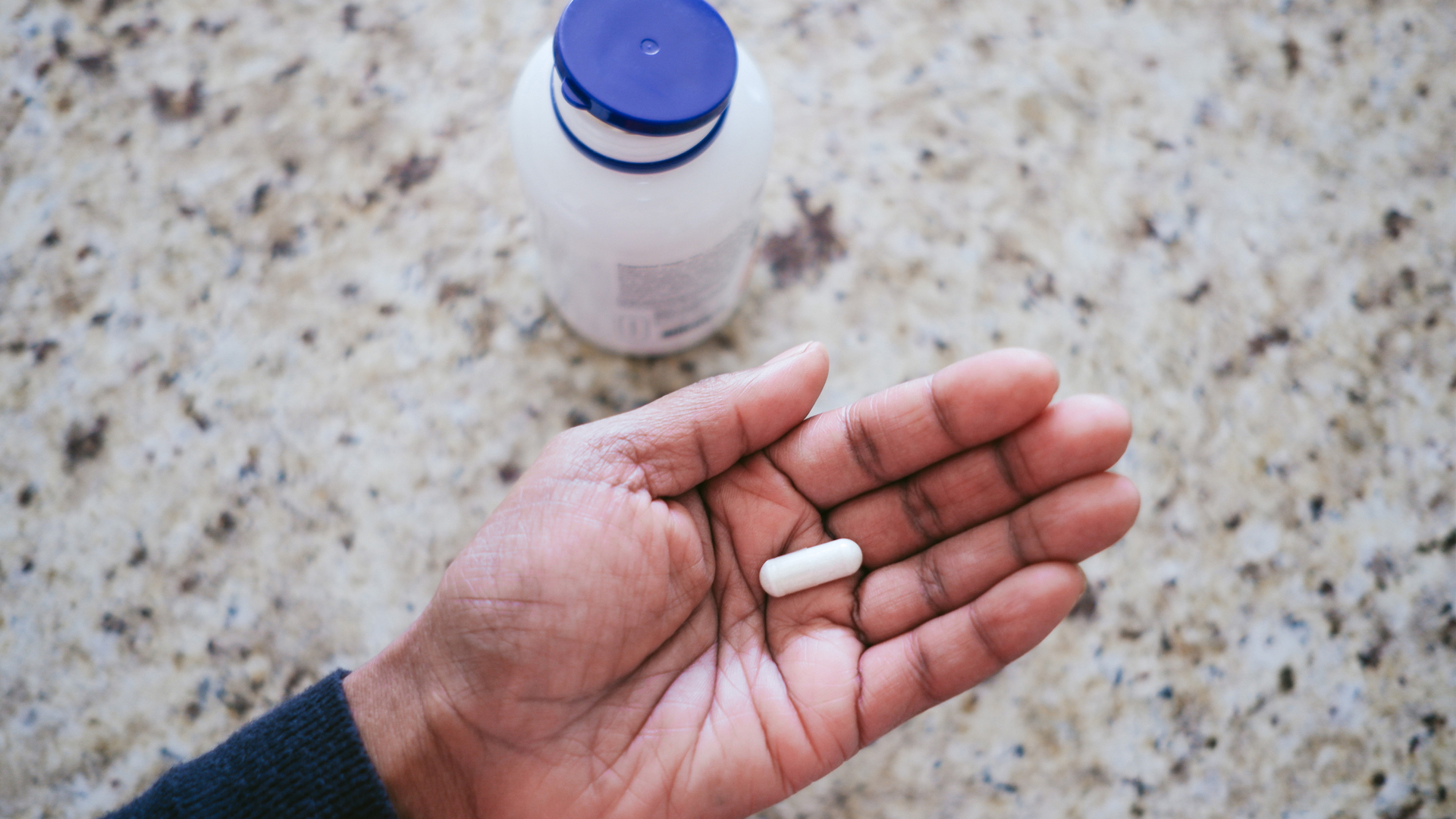Vitamin B12: Sources, benefits & deficiency
Vitamin B12 is an essential nutrient for energy, mood and more — but deficiency is a common problem

Vitamin B12 is one of eight B vitamins needed for a range of important physiological functions. It’s found naturally in animal products and fortified foods, or can be taken via supplement form or administered via injection.
“Vitamin B12 is crucial to the human body, which needs it to produce new DNA, red blood cells, proteins, hormones and fats,” explains Heather Mangieri, a registered dietitian nutritionist. “Vitamin B12 is also key to the health of nerves. It’s part of the vitamin B complex, which includes thiamin, niacin, vitamin B6 and folate. Each of these vitamins has its own unique role in the body, but most B vitamins have a role in helping your body's cells produce energy.”
The typical American diet meets or exceeds the daily recommended amount of vitamin B12 (2.4 micrograms). However, vitamin B12 deficiency remains a common problem in the United States because it can be affected by other factors, like age and digestion. Older adults, those on a vegan diet and pregnant women are especially prone to being deficient.
What’s more, people may not realize that vitamin B12 is missing from their diets because the liver can store a five-year supply in reserve. Without treatment, a deficiency can lead to mood swings or depressive symptoms, fatigue, gastric problems, muscle weakness, nerve damage and anemia.
In this article we’ll dive into the benefits of B12, as well as common sources to add to your diet, and signs of deficiency.
Why do we need vitamin B12?
Vitamin B12 has many roles in the body:
- Making red blood cells
- Keeps the nervous system healthy
- Releases energy from food
- DNA synthesis
- Helps the body use folate
- Supports a healthy pregnancy
- Important for prevention of brain and spinal cord birth defects
- Regulates mood (B12 is needed to produce the feel-good chemical serotonin)
How much vitamin B12 should you consume?
The recommended daily intake (RDI) of vitamin B12 for American adults is 2.4 mcg a day, according to the National Institutes of Health (NIH) guidelines. Pregnant and breastfeeding women will need slightly more. Only animal foods contain B12 naturally, so if you’re vegan or vegetarian, you will need to take a supplement to up your intake or eat fortified foods.
Get the world’s most fascinating discoveries delivered straight to your inbox.
Most Americans get enough of the vitamin from food, but some have trouble absorbing B12. The body absorbs vitamin B12 from food in a two-step process:
1. Hydrochloric acid in the stomach separates B12 from the protein it is attached to.
2. The vitamin B12 then combines with a glycoprotein made by the stomach, called gastric intrinsic factor, and the body absorbs them together.

The process is slightly different when it comes to B12 supplements, as they aren’t attached to protein and bypass the first step. But even B12 in supplement form needs to combine with intrinsic factor in the stomach to be absorbed by the body.
People who suffer from the autoimmune disease pernicious anemia can’t make intrinsic factor, so they have difficulty absorbing B12 from both food and dietary supplements.
The best sources of vitamin B12
- Beef
- Liver
- Kidneys
- Milk
- Cheese
- Yogurt
- Eggs
- Fortified breakfast cereals
- Tuna
- Salmon
- Shellfish
- Some fortified mushrooms
- Marmite
- Plant-based milks

Symptoms of vitamin B12 deficiency
If you have a B12 deficiency you could experience a wide range of symptoms, including weight loss, lack of appetite, fatigue, depression, poor memory and difficulty thinking straight. You could also experience a numb feeling in the hands and feet, loss of balance, sore mouth or tongue and constipation. Yellow skin, anemia, paranoia and hallucinations could indicate a vitamin B12 deficiency, according to Harvard Health Publications.
Talk to your doctor rather than self-medicating with supplements as many of the symptoms can be signs of another condition, says Mangieri.

Mangieri is a Registered Dietitian-Nutritionist (RDN), a board-Certified Specialist in Sports Dietetics (CSSD) and the author of Fueling Young Athletes (Human Kinetics, 2017.) She has over 21 years of professional experience in Wellness, Sports Nutrition/Adolescent Sports Nutrition and Disordered Eating.
Pregnancy can also lower vitamin B12 levels, as can hyperthyroidism (overactive thyroid) if it causes the person to produce too much body heat, according to the NIH. What’s more, if you’re pregnant or breastfeeding and have a B12 deficiency, your baby might also be lacking in the vitamin.
Low levels of stomach acid can also lead to overgrowth of bacteria in the small intestine. These bacteria, in turn, leach vitamin B12 from the body.
People with celiac disease or Crohn's disease may have difficulty absorbing the vitamin B12 from food or vitamin supplements.
Taking doses of folic acid higher than 1mg can mask the symptoms of vitamin B12 deficiency, which can eventually damage the nervous system if not spotted or treated. This can be more of a concern for older people who have difficulty absorbing the vitamin.
A simple blood test can confirm a B12 deficiency, and a dietary assessment can help people get the nutrients needed to redress the balance, without the need of supplements. Doctors may prescribe vitamin B12 injections to treat people who have a deficiency but would not benefit from vitamin B12 pills. Vitamin B12 can also be administered in a nasal gel, according to the NIH's Office of Dietary Supplements.
- Related: Low B12 seen in aging, autism and schizophrenia
- Related: Nine sources of vitamin C
How do B12 levels change as you age?
The body needs stomach acid and intrinsic factor to digest B12, and as we get older our ability to absorb the vitamin decreases. This is because aging adults often develop issues with the stomach acids and digestive enzymes needed to process nutrients.
Because the vitamin is important for DNA synthesis and involved in the metabolism of every cell in the body, a lack of it can lead to frailty and a decline in strength due to a reduction in the physiologic ability to maintain the homeostatic balance.
Oral vitamin B12 supplements contain a form of vitamin B12 that is easy to absorb without stomach acid, but these pills may not treat all causes of vitamin B12 deficiency, Mangieri told Live Science. People who have undergone gastric bypass surgery, for example, can develop a deficiency in intrinsic factor.
"They could be taking all the B12 orally that they want, and they won't be absorbing it properly," she says.
Nearly one-third of people over age 50 suffer from atrophic gastritis, a thinning of the stomach lining that interferes with vitamin B12 absorption. And 3.2% of people aged 50-plus are B12 deficient, according to the Centers for Disease Control and Prevention (CDC).
For that reason, the NIH recommends that anyone over fifty should get most of their daily B12 via supplements or fortified foods.
Are vitamin B12 supplements safe?
Vitamin B12 supplements are generally considered safe when taken at appropriate doses.
Your body only absorbs as much as it needs, and because the vitamin is water soluble, any excess is excreted in urine, says Mangieri, owner of Nutrition Checkup in Pittsburgh.
For this reason, the NIH doesn’t set a limit on how much vitamin B12 a person can safely take in a day. Topical application to the skin to treat psoriasis is also safe, according to the National Library of Medicine.
That doesn’t mean that vitamin B12 is 100% without risk, however.
Vitamin B12 may increase the chance of an artery narrowing around a stent (a device that widens a blocked artery) and it could potentially harm the optic nerves, causing blindness in people with the rare hereditary condition called Leber's disease.
Plus, an abnormally high vitamin B dose — anything over 900 pg/mL — could lead to liver or kidney problems, diabetes or certain forms of Leukemia, a study in the peer-reviewed Journal of the National Cancer Institute found.
- Related: Too much B12 linked to acne

Certain medications can interfere with vitamin B12 supplements, too.
- H2 blockers and proton pump inhibitors — these common treatments for heartburn and GERD (gastroesophageal reflux disease), or acid reflux, may contribute to a vitamin B12 deficiency.
- Cholesterol drug cholestyramine, antibiotics chloramphenicol, neomycin and colchicine (gout meds) — can affect stomach acid and have been linked to poor B12 absorption.
- Diabetes drug metformin - may also interfere with B12 absorption because of the medication’s effect on calcium, also needed to absorb the vitamin.
- Potassium supplements — may reduce the body’s B12 absorption rate, as can heavy drinking for more than two weeks, according to the National Library of Medicine.
This article is for informational purposes only, and is not meant to offer medical advice.
Additional resources

Maddy Biddulph is a freelance health and fitness journalist with over 26 years of experience working for consumer media in the US and UK. As a Level 3 personal trainer and weight loss advisor she is used to trying out and reviewing the latest health and fitness products. At Maddy Biddulph Personal Training, she runs one-to-one and small group sessions, as well as group exercise classes. She specializes in mobility work with seniors and runs regular chair workouts in her hometown of Oxford.
- Lauren CoxLive Science Contributor
 Live Science Plus
Live Science Plus





